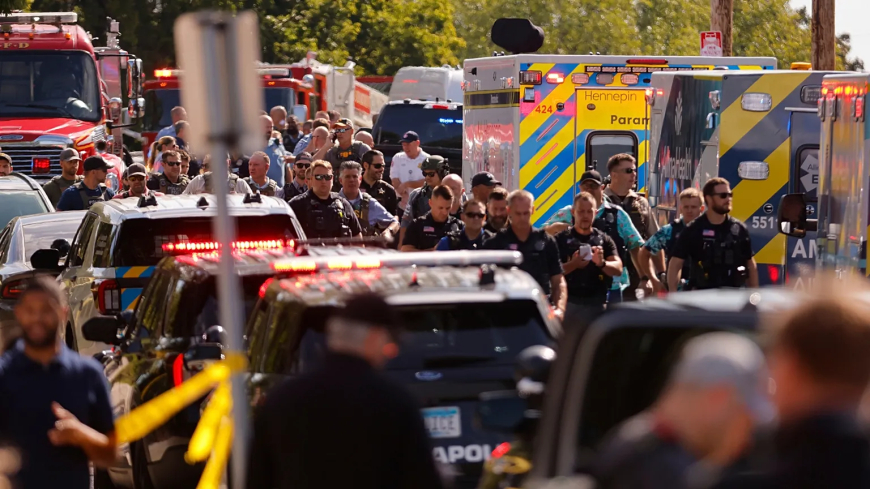Minnesota School Shooting: A Community Shattered and Questions That Remain
A mass shooting at Annunciation Catholic Church and School in Minneapolis left two children dead and 18 injured. Community members mourn, investigators search for motives, and debates over security and gun laws intensify.

A Tragedy Unfolds in a Place of Worship
On the morning of August 27, 2025, tragedy struck at the Annunciation Catholic Church and School in Minneapolis. As students, teachers, and parishioners gathered for a routine school-wide Mass, gunfire shattered the calm. Authorities say 23-year-old Robin Westman, a former student of the school, opened fire, killing two children and injuring 18 others, including three elderly parishioners, before turning the gun on themselves.
This horrifying act, carried out in a sacred space, has left a tight-knit community grappling with grief, fear, and a sense of betrayal. Many in the neighborhood remember Westman not as a stranger but as a young person who once shared the same pews and classrooms.
The Suspect’s Troubled Path
Police have confirmed that Westman was once enrolled at Annunciation and maintained ties to the parish. Investigators searching Westman’s digital footprint uncovered troubling online writings filled with antisemitic, racist, and anti-Christian rhetoric. While these findings reveal the suspect’s descent into extremist ideologies, officials say they have yet to determine a clear motive.
“We’re looking at a classic pathway to an active shooter,” Minneapolis Police Chief Mark Ransom said during a press briefing. “Alienation, online radicalization, and personal grievance appear to be overlapping factors. But at this stage, we cannot point to a single trigger.”
For parents and survivors, however, the unanswered question remains: why here, why us?
Victims and Survivors
The two children killed have not yet been publicly identified as families request privacy, but parish officials confirmed they were both elementary students at the school. Vigils have begun sprouting outside the church, with mourners leaving flowers, drawings, and stuffed animals.
Among the 18 injured, doctors at Hennepin County Medical Center report that five remain in critical condition. Three senior citizens—longtime parish volunteers—are among those wounded. “We are dealing with an unimaginable tragedy that touches every generation in our community,” said Father Joseph O’Malley, the parish priest.
A Renewed Debate on Security and Guns
This attack has reignited national debates over school security and gun access in the United States. Minnesota has seen its share of mass violence before, but shootings inside places of worship and schools carry a unique weight.
Lawmakers in St. Paul are already signaling plans to revisit school safety funding and firearm access laws. Advocates stress that while security upgrades are important, they cannot address the deeper issue of how individuals like Westman gain access to high-powered firearms in the first place.
Gun safety groups, including Everytown for Gun Safety, have called the shooting “a preventable tragedy” and demanded federal-level reforms. Meanwhile, pro-Second Amendment voices caution against sweeping restrictions, arguing that community-level mental health interventions should take priority.
Faith, Fear, and Resilience
For Annunciation’s parishioners, the shooting cuts deeper than the policy debate. It challenges their sense of sanctuary in a space that was meant to be safe, sacred, and nurturing.
Parents now face difficult questions from their children. “How do you explain to a seven-year-old that the church where she was baptized is also the place where her friends died?” asked one grieving mother at the candlelight vigil.
Yet, amidst the sorrow, there are glimpses of resilience. Students have organized prayer circles, neighbors are offering meals to affected families, and counselors are volunteering their services. “Evil visited us today,” Father O’Malley said, “but it will not define us.”
Larger Implications
The Minneapolis tragedy underscores a troubling pattern: mass shootings are increasingly targeting schools, places of worship, and other communal spaces once considered safe havens. Researchers note that shooters often select symbolic or deeply personal locations—whether due to perceived grievances or ideological motives.
As the investigation into Westman’s background continues, attention will also turn to how local law enforcement and social media platforms can better identify early warning signs. “This wasn’t random,” one FBI official said. “We need to understand how radicalization and personal grievance intersected in this young man’s life.”
Moving Forward
The community now stands at a crossroads—mourning lives lost, supporting those recovering, and demanding accountability from leaders. While debates over firearms and mental health policy will inevitably dominate the national conversation, at the local level the focus is on healing.
For Minneapolis, the memory of this August morning will linger for years to come. But as neighbors gather in solidarity, the message remains clear: the violence may have fractured their peace, but it has not broken their spirit.














